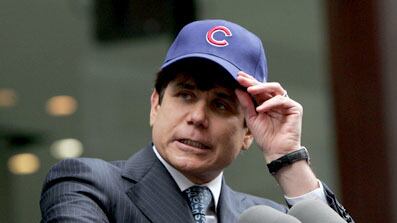
My novel Windy City (Random House: 2008) opens with the mayor of Chicago assassinated by a pizza (deep dish, artichoke, and prosciutto, to signal that this is today’s Chicago, not Al Capone’s old town). Over the course of the story, there are sting operations, sex scandals, bribes and a suicide.
I would have drawn the line at having a governor try to sell a Senate seat, as if he was hawking a stolen widescreen TV from the back of a truck. In these days of email surveillance, wiretaps, and the 24-hour news cycle, who would believe such a thing?
“Crafting dialogue between politicians entails aping the euphemisms by which they so often communicate. This is because coarse entreaties are considered unnecessary and unsophisticated—or, as one of my characters puts it, ‘like asking for a blow job over the breadbasket.’ ”
I can’t say my novel was prescient about political corruption, Chicago-style, any more than Robert Penn Warren’s All The Kings Men prophesied corruption in Louisiana—or that Mario Puzzo’s The Godfather predicted the rise of La Cosa Nostra. But ever since US Attorney Patrick Fitzgerald unveiled his case against Illinois Governor Rod Blagojevich, my novel has been cited as a primer on how Chicago politics is played.
I’ve been repeatedly asked whether any particulars of the Blago scandal reflect directly on President-elect Obama, who was schooled in Chicago’s tough politics. The short answer is no. The more complete answer is: No, but. The president-elect sounds so high-minded that you can easily forget his roots are in the nitty-gritty of big city politics (a trait he shares, perhaps, with big city Boston’s John F. Kennedy).
Obama’s enthusiasm for reform is global, not local. He has aligned himself with Chicago Mayor Richard M. Daley, while Blagojevich came to office courtesy of his father-in-law, Alderman Richard Mell, head of a city council faction that has co-existed with the Daley brothers while openly resenting the political fortune conferred by their name.
Rich and Bill Daley supported Obama for senator, president, and, in 2000, for congress against Bobby Rush just months after Rush had lost to Daley in the Democratic primary for mayor. Obama has returned their favors. If Mayor Daley runs for re-election for a seventh term in 2011, don’t expect Obama to endorse some reformer who doubts the mayor’s integrity because four of his top aides have recently been convicted of rigging hiring and promotion of city officials.
In politics, like figure skating, you get points for style. If Blagojevich had appointed someone President-elect Obama favored to fill his seat, my Chicago political sense tells me that Obama—who is surrounded by former top aides to Mayor Daley—would not need any vulgar reminders he owed a favor to the governor. He would quietly make certain that a bridge in Rockford got resurfaced with federal funds. He might invite the governor to hear Bruce Springsteen at a state dinner, or to sit near Scarlett Johansson at the National Prayer Breakfast.
To believe otherwise is to think that President-elect Obama picked Hillary Clinton or Bill Richardson for his cabinet solely on their qualifications (or that Caroline Kennedy is about to get a Senate seat on hers). Their timely endorsements of Obama made their qualifications superior to all others. And nothing says “thank you” like a cabinet post or Senate seat.
I don’t want to leave even a scintilla of an impression that Obama’s command of what’s been called the Chicago Way diminishes his promise to be a great president. The opposite is true. I think Americans will be reassured to know that when their new president sits across the table from former head of the KGB Vladimir Putin it is as a clear-eyed Chicago pol, not some callow Hyde Park academic.
Even before Blagogate, the reviews for Windy City were encouraging. But I was chagrined when a critic praised some of my dialogue when it was simply a phrase I borrowed from a real-life Chicago pol. “You can’t be a leader unless you go along with the majority!” an alderman exclaimed during a City Council debate. Another asked me, straight-faced, “What’s the world coming to when you can get a job for a total stranger more easily than you can for your brother-in-law!”
Crafting dialogue between politicians entails aping the euphemisms by which they so often communicate. This is not simply because any urban politician these days must be alert to the threat of investigation, surveillance, and confidants turning state’s evidence. It’s because coarse entreaties are considered unnecessary and unsophisticated—or, as one of my characters puts it, “like asking for a blow job over the breadbasket.”
Euphemisms are also useful. They permit a politician to be vague. Saying, “I won’t forget you,” lets a person think they may one day be chosen secretary of state. But they will have no cause to complain when they wind up as regional director at the Fresno field office of HUD.
What’s particularly fascinating about the Blagojevich allegations is that, in a time when politicians deploy consultants to parse, poach, and purify their language, the transcripts of tapped conversations read out by Fitzgerald seem refreshingly explicit.
But they may not be so. Blagojevich, who has retained the wily Edward Genson as his defense counsel, may not have been as unguarded with his language as those transcripts suggest. To hear a politician say of a Senate appointment, “I've got this thing. And it's bleeping golden. I'm just not giving it up for bleeping nothing,” sounds sensational. But where is the money that changed hands? Is this evidence of an impending crime—or just the way wiseguys talk in the locker room? Prosecutors will have to fill in the blanks, not just the bleeps.
Read an extract from Scott Simon’s Windy City.
Scott Simon is the host of NPR’s Weekend Edition with Scott Simon. He has reported stories from all fifty states and every continent, and has won every major award in broadcasting. He is the author of the memoir Home and Away, Jackie Robinson and the Integration of Baseball, and the novels Windy City and Pretty Birds. He lives with his wife, Caroline, and their daughters, Elise and Lina.






